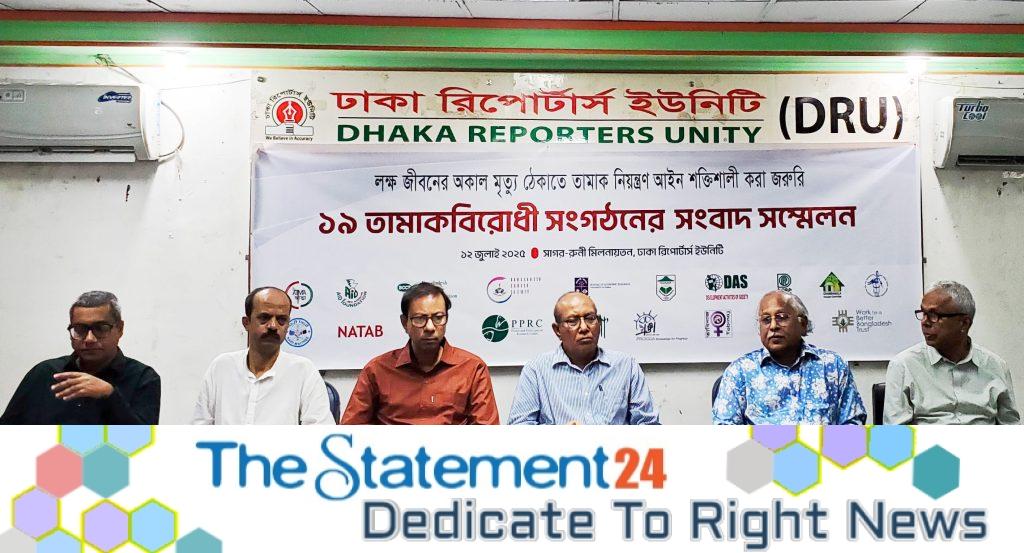
Tobacco claims nearly 161,000 lives each year in Bangladesh. Rapid amendment of the existing Tobacco Control (TC) law is a must to put an end to this massive number of premature deaths. 19 (nineteen) anti-tobacco organizations have made such demand to the government on 12 July 2025, Saturday during a press conference that took place at the Sagar-Runi Auditorium of Dhaka Reporters’ Unity.
Speakers said that tobacco is a major contributing factor in cardiovascular diseases, cancer and other non-communicable diseases (NDCs). Currently, 71 percent of all deaths in Bangladesh are caused by NCDs. Against this backdrop, without strengthening the country’s tobacco control laws, it is impossible for Bangladesh to achieve SDG Target 3.4 which is to reduce premature mortality from NCDs by one-third within 2030. Considering the overall negative consequences of tobacco use, the Ministry of Health and Family Welfare (MoHFW) in 2022 took the initiative to strengthen the tobacco control law in line with WHO Framework Convention on Tobacco Control (WHO FCTC). The draft amendment is currently going through finalization phase by a high-powered Advisory Committee. The draft contains proposals, including but not limited to: eliminating designated smoking areas (DSAs) in all public places and public transport, banning display of tobacco products at points-of-sale, banning corporate social responsibility (CSR) programs of tobacco companies, banning the sale of loose tobacco products, banning production, import and marketing of all kinds of e-cigarettes and heated tobacco products (HTPs).
It was also informed that tobacco industry has left no stone unturned to mislead policymakers and derail the amendment process. Tobacco companies have repeatedly used fearmongering tactics by raising baseless claims, such as amendment may cause a reduction in government revenue inflow, loss of livelihoods, uptick in prevalence of smoking. However, as per data provided by the National Board of Revenue (NBR), the previous two amendments of the tobacco control law, in 2005 and 2013, were followed by considerable and seamless increase in the country’s revenue inflow. Global experiences also refute claims made by the tobacco industry against the draft amendment. For example, a total of 79 countries have already banned DSAs to safeguard its people from the harm of secondhand smoking. Besides, to curb the prevalence of the use of e-cigarettes and vaping products, 42 countries, including neighboring Sri Lanka, India, Thailand and Singapore have already banned the sale and use of such products. The number of countries where the sale of loose cigarette sticks is banned now stands at 118. Such numbers show that the proposals incorporated in the draft amendment are indeed based on global best practices. Strengthening tobacco control law may often lead to a reduction in the prevalence of tobacco use, as national experiences in Brazil and Turkey suggest. This is why speakers at the event have urged policymakers not to get derailed by tobacco industry ill tactics and proceed with rapid amendment of the draft.
The press conference was jointly organized by Anti-Tobacco Media Alliance (ATMA), Aid Foundation, Bangladesh Cancer Society, BCCP, BER, Dhaka Ahsania Mission, DAS, DORP, Grambangla Unnayan Commitee, MANAS, Nari Maitree, NATAB, National Heart Foundation, PPRC, Pratyasha, TABINAJ, TCRC, WBB Trust and PROGGA.

